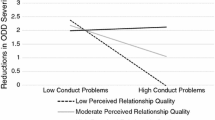Abstract
Conduct disorder is associated with several causative and maintaining factors, with family functioning being an important one. This is especially true in the Indian context, where a lot of the problem behaviors manifested by adolescents with conduct disorders are in the family context. Marital relationship of the parents is a key aspect of family functioning, affecting a number of other dimensions of family functioning, including adolescent adjustment. The paper highlights the role of parents’ marital conflict in the emergence and maintenance of adolescent conduct problems. The importance of family therapy in managing adolescent conduct disorder is discussed through case examples from India.
Similar content being viewed by others
References
S. Bharath S. Srinath S. Seshadri S. Girimaji (1997) ArticleTitleChild and adolescent psychiatry in-patient facility Indian Journal of Pediatrics 64 IssueID6 829–832 Occurrence Handle10771926 Occurrence Handle10.1007/BF02725505
D. K. Carson A. Chowdhury (2000) ArticleTitleFamily therapy in India: A new profession in an ancient land? Contemporary Family Therapy 22 387–406 Occurrence Handle10.1023/A:1007892716661 Occurrence Handle000165641400002
A. Chowdhury (1999) The status and perceptions of aged in Orissan families J. K. Baral A. Chowdhury (Eds) Family in transition: Power and development Northern Book Center New Delhi 47–56
A. Chowdhury S. Baral (1999) A study on vulnerable families J. K. Baral A. Chowdhury (Eds) Family in transition: Power and development Northern Book Center New Delhi 131–138
R. C. Das (1999) Marriage in transition: A bio-social approach J. K. Baral A. Chowdhury (Eds) Family in transition: Power and development Northern Book Center New Delhi 16–20
F. Earls E. Mezzacappa (2002) Conduct and oppositional disorders M. Rutter E. Taylor (Eds) Child and adolescent disorders EditionNumber4 Blackwell Cornwall 419–436
P. J. Frick (1994) Family dysfunction and the disruptive behaviour disorder: A review of recent empirical findings T. H. Ollendick R. J. Prinz (Eds) Advances in Clinical Child Psychology NumberInSeries16 Plenum Press New York 203–222
J. M. Gottman L. F. Katz (1989) ArticleTitleEffects of marital discord on young children’s peer interaction and health Developmental Psychology 25 373–381 Occurrence Handle10.1037/0012-1649.25.3.373 Occurrence HandleA1989U292200005
M. Gowridevi (1983) A study of families of children with conduct disorder NIMHANS Bangalore
J. M. Jenkins (2000) ArticleTitleMarital conflict and children’s emotions: The development of an anger organization Journal of Marriage and the Family 62 723–736 Occurrence Handle000088825700010
P. M. Lewinsohn H. Hops R. E. Roberts J. R. Seeley J. A. Andrews (1993) ArticleTitleAdolescent psychopathology, I: Prevalence and incidence of depression and other DSM-III disorders in high school students Journal of Abnormal Psychology 102 133–144 Occurrence Handle8436689 Occurrence HandleA1993KL72800014
S. Minuchin B. L. Rosman L. Baker (1978) Psychosomatic families: Anorexia nervosa in context Harvard University Press Cambridge, MA
L. Mullatti (1995) ArticleTitleFamilies in India: Beliefs and realities Journal of Comparative Family Studies 26 IssueID1 11–25
M. M. Patnaik (1999) Family violence in traditional Oriya society J. K. Baral A. Chowdhury (Eds) Family in transition: Power and development Northern Book Center New Delhi 148–156
G. R. Patterson (1982) Coercive family process: A social learning approach Castalia Press Eugene OR
S. Srinath (1993) Classification in child psychiatry M. Kapur S. Kellman R. Tarter R. Wilson (Eds) Child Mental health: Proceedings of the Indo-US symposium NIMHANS Bangalore 54–60
Sundaram, M. S. (2005). Diagnostic and correlative study of conduct symptoms in children and adolescents. Unpublished MD Thesis: NIMHANS.
Swaminatha, G., Srinath, S., & Sharan, R. (1986). Conduct disorders – A file review of 110 cases. Paper presented at the Annual Conference of Indian Psychiatric Society, Jaipur. Cited in S. Srinath (1993). Classification in child psychiatry. In M. Kapur, S. Kellman, R. Tarter & R. Wilson (Eds.), Child mental health: Proceedings of the Indo–US symposium (pp. 54–60). Bangalore: NIMHANS
P. Talwar (1998) ArticleTitleThe family and peer group influences in aggression Indian Journal of Psychiatry 40 IssueID4 346–349
Author information
Authors and Affiliations
Corresponding author
Additional information
Shalini Anant, MPhil, PhD Scholar, Department of Clinical Psychology, National Institute of Mental Health and Neuro Sciences (NIMHANS), Bangalore 560029, India. Ahalya Raguram, PhD, Additional Professor, Department of Clinical Psychology, NIMHANS, Bangalore 560029, India. Address correspondence to Shalini Anant (shalinianant@gmail.com).
Rights and permissions
About this article
Cite this article
Anant, S., Raguram, A. Marital Conflict Among Parents: Implications for Family Therapy with Adolescent Conduct Disorder. Contemp Fam Ther 27, 473–482 (2005). https://doi.org/10.1007/s10591-005-8234-x
Issue Date:
DOI: https://doi.org/10.1007/s10591-005-8234-x



